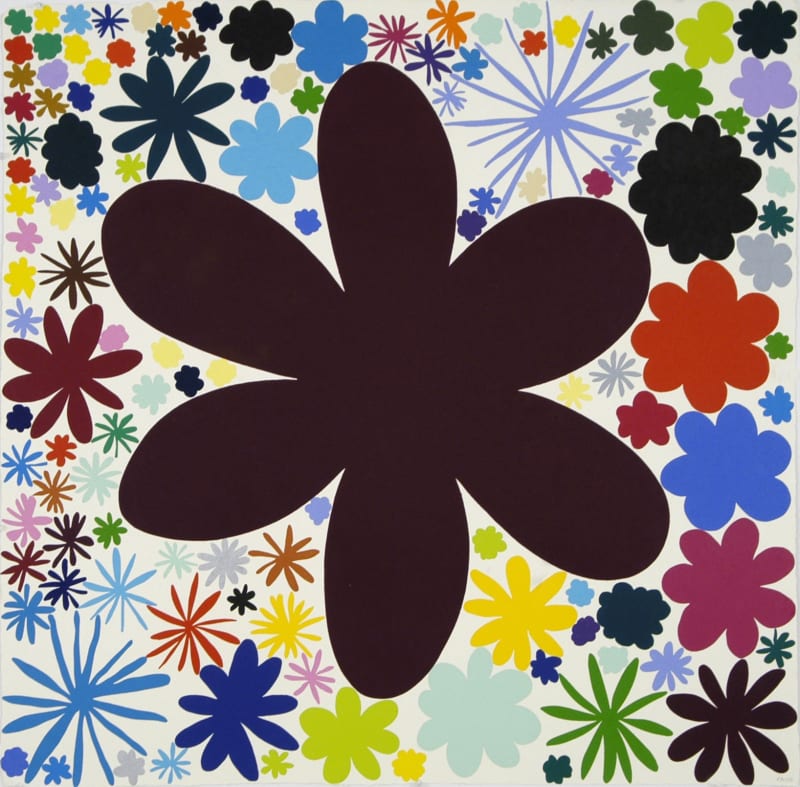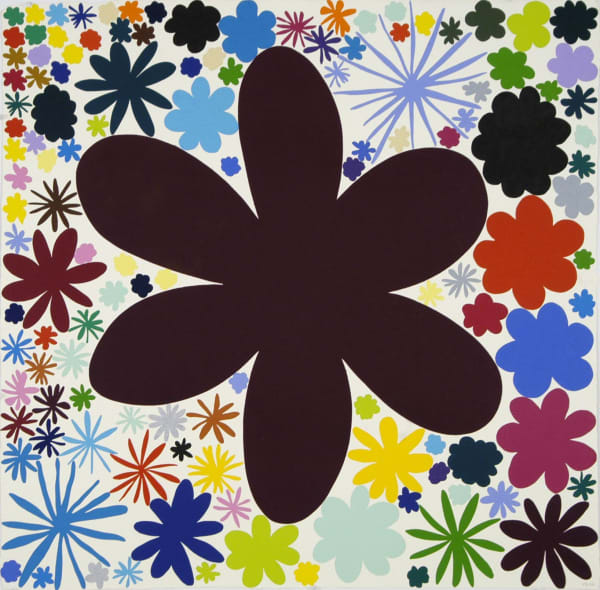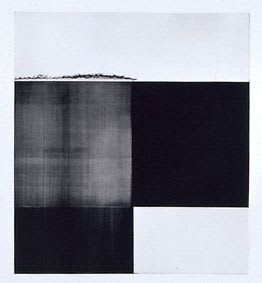Print Run: An Exhibition of Contemporary Prints
Print Run presents a new exhibition of prints by five contemporary artists from Britain and abroad.
Polly Apfelbaum is known for her floor installations comprised of hundreds of hand-cut and hand-dyed pieces of fabric that explore issues of domesticity, femininity, and decoration. Her series of prints Love me Tender revisits Warholian flower iconography that she has referenced in previous works. Apfelbaum produces flowers with her own hand, allowing gesture and accident to take their places within the works each flower is influenced by its neighbour’s scale and tone, the whole image is then reproduced as a unique monoprint.
Craigie Horsfield’s modest, playful and small scale prints entitled Irresponsible Drawings have at their centre themes which are constants of Horsfield’s work: the evanescence of light, darkness, and the awareness of shaded perception. Things depicted take on a sense of the gravity of the present. The drawings form a study of intimacy in the world of inanimate things and our understanding of them.
Callum Innes’ work explores the possibilities of paint. Uninhibited by, yet very aware of, the achievements of the past and the rise of other media, Innes uses the language of the monochrome, an established format of abstract painting since the 1960s. This suite of 5 prints entitled VI – X is created through a process of addition and subtraction – a similar process to his paintings. Using this method he has established his own vocabulary in the form of distinctive groups of works, which evolve concurrently. Through their interdependency he hones his visual fluency, exploring variations of the process of removal.
Tacita Dean’s The Russian Ending, is a suite of photogravure etchings that takes as its point of departure a procedure common in the early decades of the 1900s, in which filmmakers in Denmark would prepare different endings for different audiences. Typically, a film distributed in America would have the requisite happy ending, while the Russian version of the same film would end in calamity. The twenty images in The Russian Ending are annotated with handwritten 'stage directions,' – they are imagined as storyboards for disastrous finales of fictional films.
Thomas Schütte's approach to making art falls outside the scope of mainstream contemporary practice, employing a wide range of disciplines, from figurative sculpture and architectural models to drawing, watercolour painting and printmaking. His work combines the actuality of history and lived experience with the fantastical and the utopian. This series of six etchings entitled Bunker N relates to the artist’s architectural prototypes. Its imagery alludes to contemporary notions of shelter or protection, both political, personal and artistic.
Image: Polly Apfelbaum, Love Me Tender 11, 2004/2005
-
 Polly ApfelbaumLove Me Tender 11, 2004Unique multi color woodblock monoprint on Hiromi Handmade DHM-11 Triple Thick39 x 39 inches
Polly ApfelbaumLove Me Tender 11, 2004Unique multi color woodblock monoprint on Hiromi Handmade DHM-11 Triple Thick39 x 39 inches
99.1 x 99.1 cm -
 CALLUM INNESVl - X, 2005Set of five photopolymer intaglio etchings, with chine colleé, printed on Fabriano Artistico paper 600G, grey clothbound solander. Signed and numbered65 x 58 cm paper size each, framed
CALLUM INNESVl - X, 2005Set of five photopolymer intaglio etchings, with chine colleé, printed on Fabriano Artistico paper 600G, grey clothbound solander. Signed and numbered65 x 58 cm paper size each, framed
25.6 x 22.8 in paper size eachEdition of 20 -
 TACITA DEANThe Russian Ending, 2001Portfolio of 20 etchings in photogravure54 x 79.4 cm each (paper size)
TACITA DEANThe Russian Ending, 2001Portfolio of 20 etchings in photogravure54 x 79.4 cm each (paper size)
21.3 x 31.3 inEdition of 35







